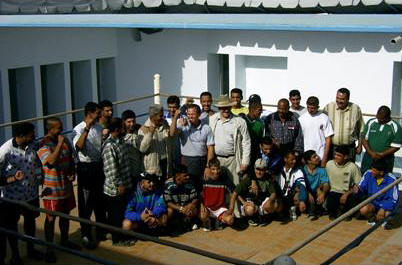
The Iraqi Boxing Team, training to qualify for the 2004 Olympics in Athens, Greece.
Boxing is good for reconciliation
Mar 27th 2008 | BAGHDAD
From The Economist
Breaking down sectarian barriers by letting youngsters biff each other
When the fighting resumes it will be a welcome return to normality for a bunch of muscular young men in Baghdad’s recently beleaguered Sunni enclave of Adamiya. They have managed, for five years, to avoid bullets and bombs. Now they will be ducking and weaving in a boxing ring where generations of Iraqi champions were reared in times of peace. For the Adamiya Boxing Club, one of the capital’s oldest and most respected sporting institutions, is poised to open its doors again. And the punchers will, it is hoped, come from both Shia and Sunni districts.
Until recently the club, at a strategic crossroads in the heart of Adamiya, had been used as a barracks by the Iraqi army. Its famous ring had been chopped up for firewood by soldiers trying to keep warm. Now the club echoes to the sound of hammers and drills. Volunteers are up ladders, rewiring and repainting. Some 300 aspiring pugilists ranging in age from eight to 50 are dusting off their gloves.
A deal arranged with the Iraqi army by American commanders in the area has seen the club handed back to the community. “Life is far from perfect but it’s a sign it can begin again,” says the club’s jovial boss, Farouq Shamsoon, a boxing legend who fought for Iraq in two Olympic games. He insists that there will be no sectarian animosity. “Our club has always been for everyone.”
Since the sectarian bloodbath after the bombing of the Shias’ Samarra mosque in early 2006, Baghdad has become a labyrinth of concrete blast-walls behind which sectarian tensions have been contained but not eliminated. Adamiya has been walled off. Once a stronghold of support for Saddam Hussein, it then, during America’s occupation, became a haunt of various Sunni insurgent groups, including al-Qaeda. Perched on the tip of the mainly Shia east bank of the Tigris river, it is hemmed in by predominantly Shia districts. Its inhabitants were terrorised, after the Samarra bombing, by Shia militias.
Then the Americans put up a “great wall” of concrete, several metres high, several miles long. They also encouraged the setting up of neighbourhood security groups known as “Sons of Iraq”. Many locals say they hate the wall and are suspicious of the armed young men manning local checkpoints alongside it, but the violence has dropped dramatically. Mr Shamsoon says his club will also pull down mental barriers. “Our youths have seen the futility of street violence,” he says. “We will channel their energies to something more positive.”
http://www.economist.com/world/africa/displaystory.cfm?story_id=10926023